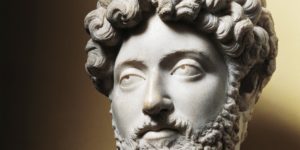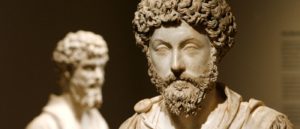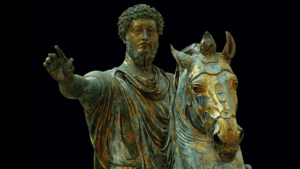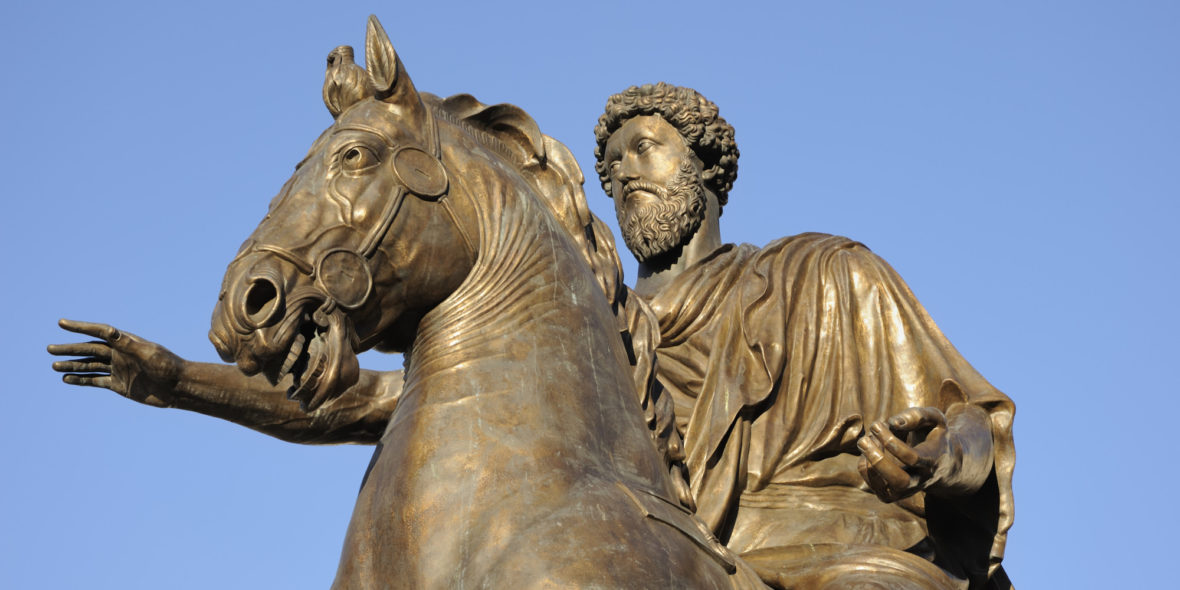Marcus Aurelius was the Roman emperor from 161 to 180, ruling jointly with his adoptive brother, Lucius Verus, until Verus’ death in 169, and jointly with his son, Commodus, from 177 until Aurelius’ own death. He was the last of the so-called Five Good Emperors. Take a look below for 25 more fun and interesting facts about Marcus Aurelius.
1. He was a practitioner of Stoicism, and his untitled writing, commonly known as Meditations, is a significant source of the modern understanding of ancient Stoic philosophy.
2. During his reign, the Roman Empire defeated a revitalized Parthian Empire in the East.
3. In central Europe, Aurelius fought the Marcomanni, Quadi and Sarmatians with success during the Marcomannic Wars, although the threat of the Germanic peoples began to represent a troubling reality for the Empire.
4. The persecution of Christians increased during the reign of Marcus Aurelius.
5. His death in 180 is considered the end of the Pax Romana and the increasing instability in the west that followed has traditionally been seen as the beginning of the eventual fall of the Western Roman Empire.

6. His family originated in Ucubi, a small town southeast of Cordoba in Iberian Baetica.
7. Aurelius’ family rose to prominence in the late first century AD. His great-grandfather, Marcus Annius Verus, was a senator and ex-praetor.
8. After his father’s death, Aurelius was raised by his paternal grandfather who, according to Roman Law, had always retained the “patria potestas” over his son and grandson.
9. Marcus was raised in his parents’ home on the Caelian Hill, a district he would affectionately refer to as “my Caelian.”
10. Marcus’ grandfather owned his own palace beside the Lateran, where Marcus would spend much of his childhood.
11. Marcus thanks his grandfather for teaching him, “good character and avoidance of bad temper.” He was less fond of the mistress his grandfather took and lived with after the death of Rupilia Faustina, his wife.

12. He was taught at home, in line with contemporary aristocratic trends; he thanks Catilius Severus for encouraging him to avoid public schools.
13. One of his teachers, Diognetus, a painting-master, proved particularly influential; he seems to have introduced Marcus to the philosophic way of life.
14. In April 132, with some advice from Diognetus, Marcus took up the dress and habits of a philosopher: he studied while wearing a rough Greek cloak, and would sleep on the ground until his mother convinced him to sleep on a bed.
15. When Marcus died, he was immediately deified and his ashes were returned to Rome, and rested in Hadrian’s mausoleum until the Visigoth sack of the city in 410.
16. Marcus was succeeded by his son Commodus, whom he had named Caesar in 166 and with whom he had jointly ruled since 177. It was only the second time that a “non-adoptive” son was chosen as heir to the throne.
17. Historians have criticized Marcus’ choice on having Commodus succeed him as Commodus’ was known for his erratic behavior and his lack of political and military acumen.

18. Marcus Aurelius acquired the reputation of a philosopher king within his lifetime, a title that would remain after his death.
19. Iain King concluded that Marcus Aurelius’ legacy is tragic because the emperor’s, “Stoic philosophy – which is about self-restraint, duty, and respect for others – was so abjectly abandoned by the imperial line he anointed on his death.”
20. According to Gibbon, with the onset of the Germanic war, Aurelius’ treatment of the Christians degraded with increased persecutions uncharacteristic of the previous years of his reign and those of his predecessors.
21. He started nibbling on dry bread to give him the strength to stay awake through his morning receptions.
22. In 140, Marcus Aurelius became consul, or leader of the senate; a post he would hold two more times in his lifetime.

23. Antoninus Pius, only a year after he became emperor, had the title Caesar placed on Marcus in 139. His daughter Faustina probably married Marcus in 140. Throughout the reign of Antoninus, Marcus worked closely with him.
24. When Antoninus died and Marcus become emperor, he insisted that Verus also be given full power. Therefore, for the first time, Rome had two equal emperors.
25. The reason why two emperors worked in Rome during the time of Aurelius was because of the good nature of Verus and his acceptance of Marcus’s seniority in years and judgment.




